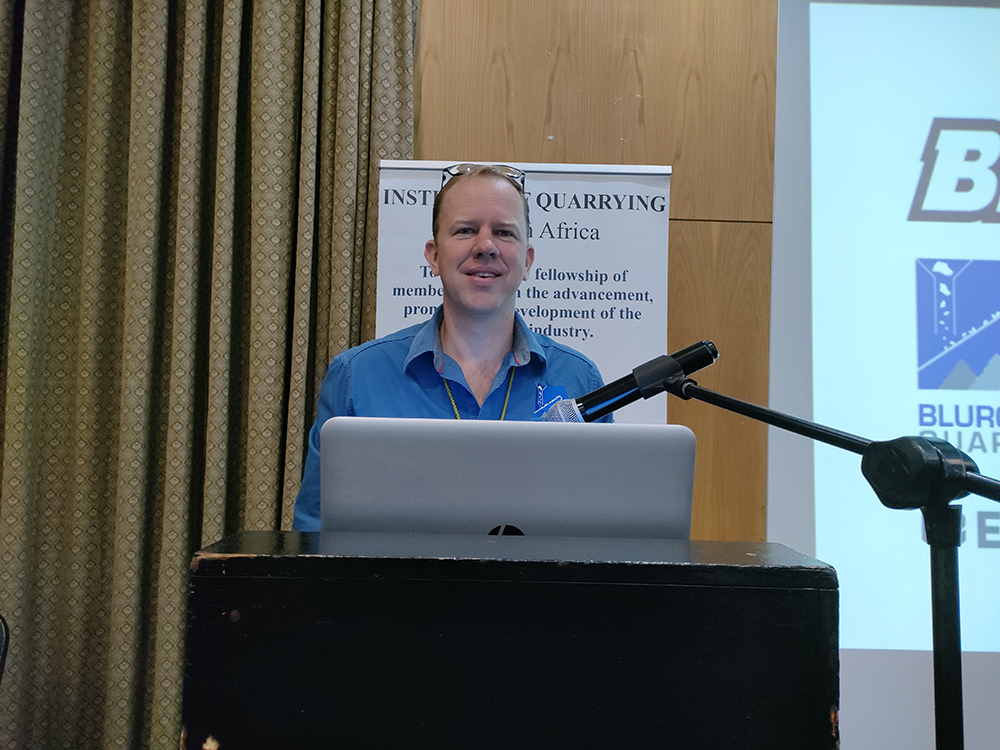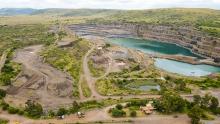
The Institute of Quarrying Southern Africa successfully held its annual conference in March following a two-year Covid-19 influenced hiatus. Held under the ‘IQSA Reconnect’ theme, the conference highlighted training and technology as areas of immediate attention. Munesu Shoko attended the event for Aggregates Business
In the past two years, the Covid-19 pandemic has undoubtedly decimated the conferences and exhibitions space, and the Institute of Quarrying Southern Africa (IQSA) conference, a staple on the quarrying industry’s annual calendar in southern Africa, was not spared. This year’s event – held on March 16 – 17 at the Kopanong Hotel & Conference Centre in Gauteng, South Africa – was a platform for reconnection after the industry last congregated in 2019.

The conference kicked off with Jeremy Hunter-Smith, CEO of KwaZulu-Natal based Blurock Quarries, officially taking the reins as the IQSA chairperson. Taking over from PPC’s Lazarus Meko, Hunter-Smith will be at the helm for the next two years.
Speaking during his inauguration, Hunter-Smith called on the quarrying industry to focus on skills development to respond to an ever-changing business and operational environment. To this end, IQSA used this year’s event to launch the IQ Academy Select. The online courses provide a flexible and innovative approach to continuous professional development (CPD). The programme offers access to the latest bite-size eLearning modules and structured content, all of which can be undertaken based on each business’s needs.
According to Hunter-Smith, the Institute of Quarrying (IQ) has been supporting industry employers since 1949, developing high-quality training and raising standards to meet the needs of an ever-changing industry. The IQ’s training and qualifications are recognised globally, with flexible learning formats available to meet the needs of both individuals and quarry operators.
“The IQ Academy Select is our way of championing skills development for our members,” says Hunter-Smith. “The programme will allow young professionals to gain CDP points along their journey to their required professional field within the industry. It is designed for all learning styles, and members can learn at their own pace. Available courses include health and safety, blasting, geology, sustainability, environmental, processing, extraction and planning, among others.”
In addition, Hunter-Smith says although Covid-19 has wreaked havoc across industries, there are also ample lessons to be learnt from the pandemic. Most importantly, he says, the pandemic has reinforced the industry’s need to speed up its digital transformation and take-up of modern technologies at large.
“To stay competitive in the post-COVID era requires new strategies and practices. For the quarrying industry to succeed, there is a need to recognise technology’s strategic importance as a critical component of the business, not just a source of cost efficiencies,” he says.
As part of the industry’s focus on modern technologies, this year’s IQSA conference cast the spotlight on digitalisation, with MINTEK’s Petrus J. van Staden giving a presentation on the digitalisation of quarry operations. Van Staden highlighted some of the work that MINTEK, a global leader in mineral and metallurgical innovation, is doing as part of the 25 companies/institutions from 10 countries working on the European Union-funded DIGIECOQUARRY (DEQ) project.
Currently, quarries are missing great opportunities for digitalisation. In fact, they are said to use less than 1% of the data produced. The biggest challenge is connecting all the quarry processes and integrating their management in real-time to improve and optimise their operating regime. DIGIECOQUARRY’s ambition is to tap the full potential of ‘digital quarries’ through a significant breakthrough in process digitalisation and automation capabilities for the aggregates sector.
Through their exhibits, Loadtech Group, a specialist in load weighing systems, and BME, a bulk mining explosives and blasting technology supplier, also highlighted the importance of new technologies in achieving sustainable quarrying.
The theme for Loadtech’s exhibit at this year’s IQSA conference was mining efficiency, with the company exhibiting a range of its market-leading technologies. As the quarrying industry anticipates a positive business cycle, the Loadrite L3180 Smart Scale, launched locally two years ago, ushers in a new era in load weighing systems, says Glen Webster, sales director at Loadtech.
Webster notes that the next generation L3180 loader scale is the company’s best load weighing system to date and changes the game in the industry through its ability to adjust for rough terrain, technique and movement so new and skilled operators can load with greater accuracy, precision and speed.
The Loadrite L3180 SmartScale uses weighing intelligence and solid-state sensors for more accurate, precise and faster loading, says Webster. It also connects machines and devices for the collection and syncing of data via the built-in WiFi to the InsightHQ reporting portal. When using Trimble’s cloud-based InsightHQ quarry reporting portal, personnel can access site production and operator performance KPIs on desktop or mobile devices.
“Fixed and mobile equipment is a major investment, and efficient use of these assets is key to maximising profits. Given that the precise determination of the weight of products being carried at quarries is a crucial parameter in the daily functions of operations, it is essential to adopt efficient and accurate onboard weighing solutions,” says Webster.
BME sensed a positive tone at this year’s IQSA conference, and Tinus Brits, BME’s global product manager – AXXIS, says this is a clear indication that the region’s economy is recovering.
He notes that the presentations at the IQSA event provided an encouraging picture of emerging economic opportunities – especially in road construction, which relies on quarries for aggregate and other building materials. As plans are implemented to repair the South African national infrastructure and roll out new projects, contractors are expected to become much busier this year.
To provide context, the South African Roads Agency Limited (SANRAL) reiterated its commitment to roll out a total of 1 218 projects over the next three years (at least 406 per year) to ensure service delivery.
“There are definitely improvements in the performance of a range of sectors, and it was exciting to hear that SANRAL has a strong pipeline of projects,” says Brits. “As quarries position themselves for the growing demand, they are also looking for better efficiencies of their operations – which is where BME makes an important contribution.”
At the event, BME displayed its new AXXIS Silver digital initiation system, which was specifically developed with quarrying in mind. Over time, electronic detonation technology has become more popular in the quarrying sector, says Brits.
He sees more quarry managers moving towards newer blasting technology for a couple of key reasons. As quarries age, areas to be blasted can become more challenging, requiring that blasting techniques and equipment become more accurate, flexible and controlled. There is also a cost factor related to energy consumption, where rising electricity prices are incentivising energy efficiency.
“Quarries want their primary blasted rock to be optimally fragmented, so that their crushers operate as productively and efficiently as possible,” says Brits. “A presentation at the IQSA conference estimated that the added cost of secondary blasting or breaking of large boulders could reach four times the cost of the initial blast.”
This is where electronic detonators – and the suite of digital tools that accompany this technology – allow quarries to achieve a higher quality of blasts, with better results. Conference visitors showed considerable interest in AXXIS Silver, he says, which is a slimmed-down version of BME’s flagship initiation system, AXXIS Titanium.
According to Bennie van Nieuwenhuizen, BME’s AXXIS quality manager, the company has already seen a massive interest in its AXXIS Silver system following its launch late last year.
“Our existing customers operating our AXXIS GII system are enthusiastic about moving up to AXXIS Silver – and we also received considerable interest from potential customers who would like to see the new system demonstrated and tested on their sites,” says Van Nieuwenhuizen. “For those quarries still using non-electric detonation methods, the step to take them to AXXIS Silver is easily manageable.”
Van Nieuwenhuizen says there has been a steady annual conversion rate of quarries from non-electric to electronic detonators of about 12 – 14. Within the next five years, he says, it is likely that most quarries will have moved over to electronic detonation.
AXXIS Silver retains all the stringent safety features that have made AXXIS Titanium so popular, including an application-specific integrated circuit (ASIC) chip in the BME detonators. Among the added benefits of the ASIC is more internal safety gates against stray current and lightning – which enhances safety levels and allows for inherently safe logging and testing.
“The new system speeds up the blasting process, as the logging, testing and programming is done with one unit and requires only one visit to the blast hole,” he says.
The AXXIS Silver initiation system integrates with BME’s Blast Alliance suite of digital tools, including its BLASTMAP blast planning software, XPLOLOG data logger and online dashboard, and the Blasting Guide App for Android devices. This allows customised solutions that can be implemented with speed, accuracy and safety.
“There are also specific advantages for quarries that we have built into AXXIS Silver, such as the thinner wire which we’ve developed to suit small-diameter waterlogged blastholes. This results in a perfectly straight wire down the hole, so you know exactly where the booster is – without compromising on the line strength,” concludes Van Nieuwenhuizen.








